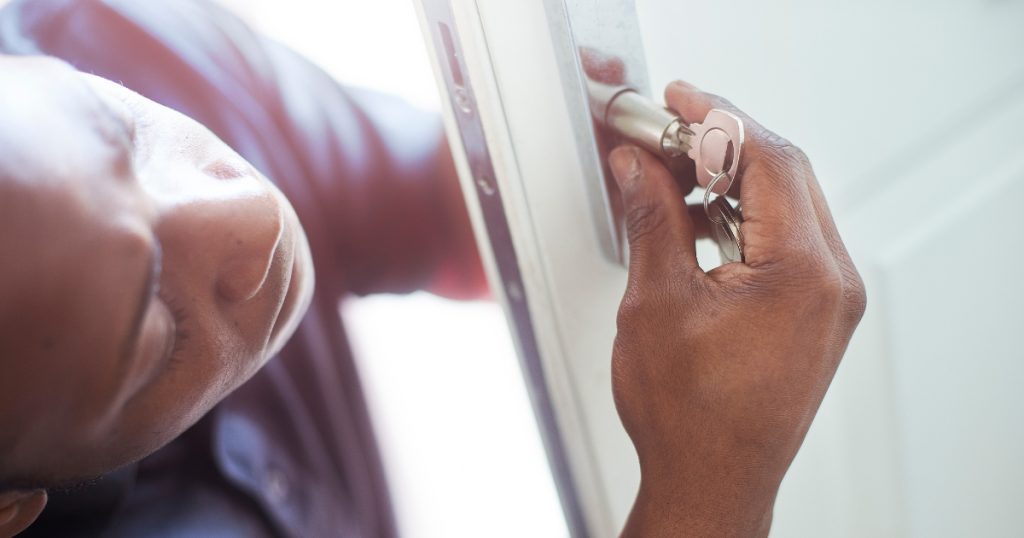Door locks provide a sense of security, privacy, and protection for our homes and businesses. However, when a door lock is broken or malfunctioning, it can cause a great deal of inconvenience, frustration, and anxiety.
Knowing when to call a professional locksmith to fix your door locks can save you time, money, and potential security risks. In this comprehensive guide, we will discuss various situations in which it is best to call a locksmith, as well as how to choose the right locksmith for the job.
Identifying the Problem with Your Door Lock
- Stuck or Jammed Locks
One of the most common issues with door locks is when they become stuck or jammed. This can occur for several reasons, including:
- Dirt, debris, or rust buildup
- Misaligned door latch
- Damaged lock components
- Key broken off inside the lock
If you are unable to resolve the issue yourself by cleaning the lock or realigning the door, it is best to call a locksmith to diagnose and fix the problem.
- Difficulty Locking or Unlocking
If you are experiencing difficulty locking or unlocking your door, it could be due to a number of factors, such as:
- Worn or damaged keys
- Worn or damaged lock cylinders
- Misaligned door or frame
- Swelling or contracting of the door due to temperature or humidity changes
Again, if you are unable to identify and resolve the issue on your own, it is best to call a locksmith to properly diagnose and fix the problem.
When to Call a Locksmith to Fix Your Door Lock
- Attempted Break-In or Vandalism
If you have experienced an attempted break-in or vandalism, it is crucial to call a 24 hour locksmith immediately to assess and repair any damage to your door lock. A compromised lock can leave your property vulnerable to further security breaches.
A local locksmith will be able to determine if your lock needs to be repaired or replaced and can provide you with recommendations for additional security measures.
- Lost or Stolen Keys
Losing your keys or having them stolen can leave you feeling vulnerable and at risk. In such cases, it is essential to call a locksmith to rekey or replace your locks. Rekeying involves changing the internal components of the lock so that the old key will no longer work, while replacing the lock involves installing a completely new lock. A locksmith can help you decide which option is best for your situation.
- Moving into a New Home or Business
When moving into a new home or business, it is always a good idea to have the locks changed or rekeyed by a professional locksmith. This ensures that previous occupants, who may still have keys, cannot access your property.
Additionally, a residential locksmith can assess the overall security of your property and provide recommendations for upgrades or improvements.
- Malfunctioning Electronic or Smart Locks
Electronic or smart locks can offer increased security and convenience, but they are not immune to issues. If you are experiencing problems with your electronic or smart lock, such as connectivity issues, battery failure, or software glitches, it is best to call a locksmith with expertise in these types of locks to diagnose and resolve the issue.
Choosing the Right Locksmith for the Job
- Look for Recommendations
Asking friends, family, or neighbours for recommendations is an excellent way to find a reputable locksmith. You can also search online for reviews and testimonials to gain insight into the quality of work and customer service provided by local locksmiths.
- Verify Credentials and Insurance
Before hiring a locksmith, it is essential to verify their credentials and ensure they are licensed, bonded, and insured. This will protect you in case of any accidental damage or injury during the repair or installation process.
In the UK, you can check if a locksmith is a member of the Master Locksmiths Association (MLA), which is a reputable industry organisation that promotes high standards and professionalism.
- Get a Quote
Before agreeing to any work, it is important to get a written quote detailing the cost of labour, materials, and any additional fees. This will help you avoid any unexpected charges and ensure that you are receiving a fair and competitive price.
- Ask About Warranties and Guarantees
A reputable locksmith should be confident in the quality of their work and be willing to offer a warranty or guarantee on their services. Be sure to ask about the terms and conditions of any warranties or guarantees, as well as any exceptions or limitations.
- Assess Communication and Professionalism
Good communication is essential when working with a locksmith. A professional locksmith should be able to answer your questions, provide clear explanations, and keep you informed throughout the process. Additionally, they should be punctual, courteous, and maintain a professional appearance.
Tips for Maintaining Your Door Locks
To prolong the life of your door locks and minimise the need for repairs or replacements, follow these maintenance tips:
- Clean Your Locks Regularly
Dirt, dust, and debris can accumulate in your locks over time, causing them to become difficult to operate or even jammed. Regularly cleaning your locks with a mild detergent and a soft cloth can help prevent this buildup and keep your locks functioning smoothly.
- Lubricate Locks Annually
Applying a graphite or silicone-based lubricant to your locks at least once a year can help to keep them operating smoothly and prevent wear and tear. Avoid using oil-based lubricants, as they can attract dust and dirt, leading to further issues.
- Check Door and Frame Alignment
Misaligned doors and frames can cause issues with your locks and may even lead to damage over time. Periodically check your door and frame alignment and make any necessary adjustments to prevent problems with your locks.
- Replace Worn or Damaged Keys
Worn or damaged keys can cause difficulty when locking or unlocking your door and may even damage the lock itself. If you notice that your key is becoming worn or damaged, it is best to have a new one made by a professional locksmith.
Conclusion
A broken door lock can be a significant inconvenience and a potential security risk. Knowing when to call a locksmith to fix your door locks is crucial in maintaining the safety and security of your property.
By following the advice in this guide, you can confidently determine when to call a locksmith, choose the right professional for the job, and maintain your locks to ensure their longevity and functionality.

